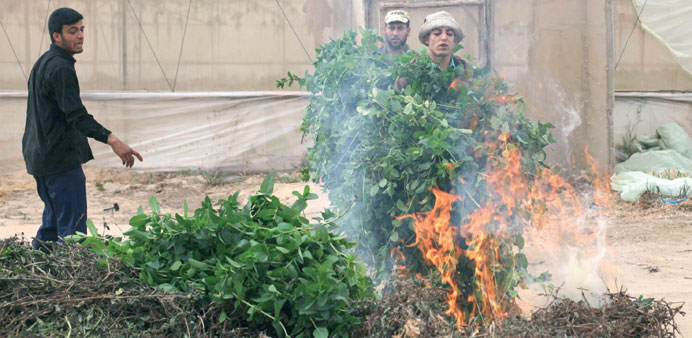|
Palestinian farmers in Gaza began destroying three tonnes of herbs yesterday, saying a prolonged closure of the crossing into Israel meant the plants were no longer fit for export to Europe. |
Last October, Israel lifted a five-year ban on the lucrative export of Gazan herbs and spices, imposed after Hamas seized control of the coastal enclave, and farmers had hoped to cash in with their latest crop of mint and basil.
But Israel shut its sole commercial crossing into the isolated Palestinian territory last Monday in response to a rocket salvo fired out of Gaza, allowing only a brief reopening on Friday to enable the import of certain goods.
Farmers said the closure came just as they were preparing to harvest two tonnes of mint and a tonne of basil, adding that the herbs were now past their prime for the European market.
“It was too late and we regret that we have had to throw away the farmers’ harvest,” Jamal Abu Naja, director of Gaza’s communal agriculture association, said. “Repeated closures are threatening this hopeful project.”
The Palestinian economy is bound closely to Israel’s through infrastructure and has few foreign trading partners. Israel’s security cordon around Gaza and its security restrictions in the occupied West Bank limit Palestinians’ ability to compete in export markets and contribute to an unemployment rate of almost 25%, the World Bank said last month.
Israel and Hamas fought an eight-day war last November that ended with an Egyptian-brokered ceasefire.
After three months of quiet, militants fired a rocket into Israel at the end of February, with very occasional salvos following in subsequent weeks. Israel has responded each time by closing the Kerem Shalom commercial crossing.
Abu Naja urged farmers to take advantage of the decision to lift the curb last year, pointing to high demand in Europe for spices and herbs, with traders paying $26 a kilo for the Palestinian produce against $0.27 on the home market.
Some 15 tonnes of spices have been exported since January, but the latest crop was mowed down yesterday and will be burnt after it has dried in the sun, farmers said.
“It took a month to grow this mint and if you don’t export it at the right time, you have to burn it because there is very little local consumption,” Abu Naja said.
To date, some 30 dunam (7.4 acres) have been turned over to herbs.

